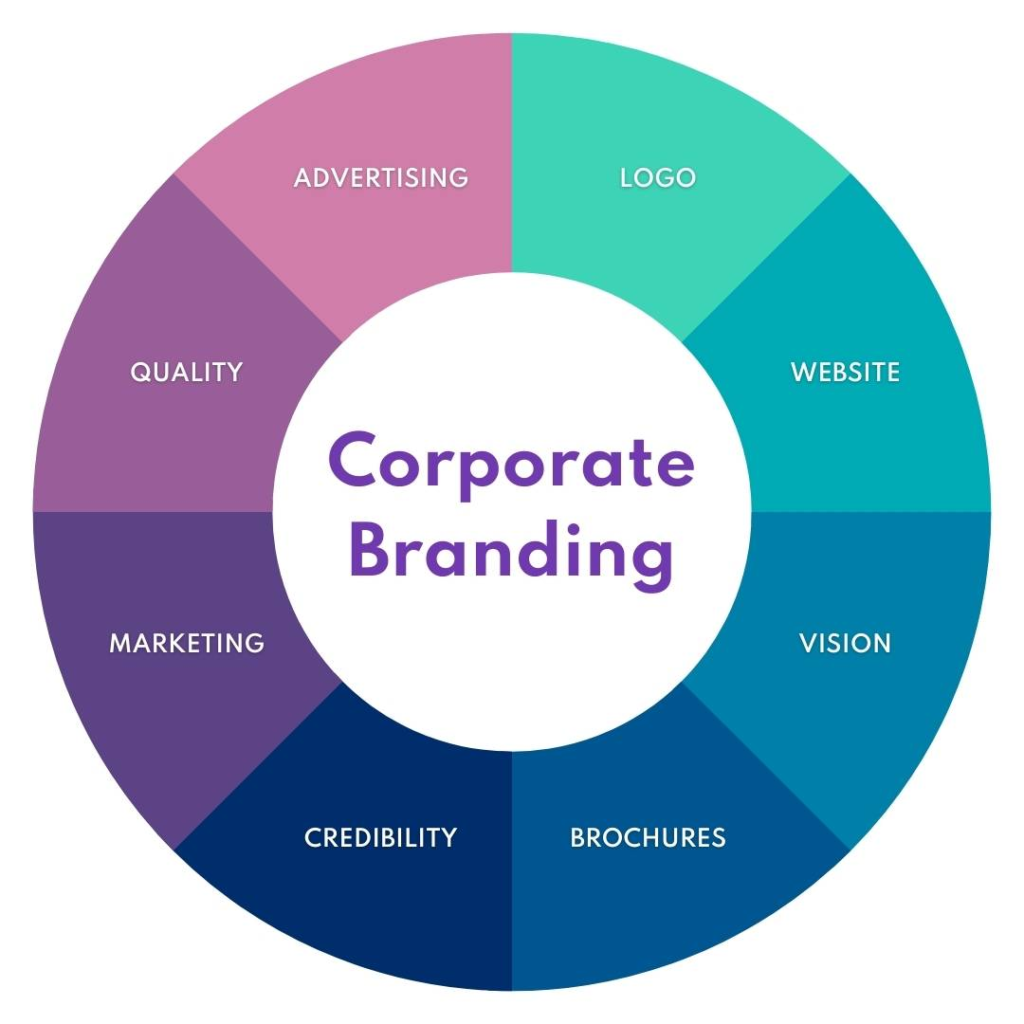Apple, Google, and other well-known companies have become similar with success and have established themselves as leaders in their respective industries. Their massive revenues of $242 billion and $207 billion respectively are a testament to their strong corporate brands. But how did they achieve this level of success? The answer lies in their effective use of corporate branding marketing.
Corporate branding is a powerful tool that can work wonders for any business, whether it’s a small startup, a local company, or a growing enterprise. It all starts with gaining a basic understanding of this field and knowing what corporate branding service you need. The best part is that it’s not complicated or expensive. Anyone can replicate their success stories with the help of a professional corporate branding company. However, there is a catch.

Mastering corporate branding is not easy. It all starts with gaining a basic understanding of this field and knowing what corporate branding services you need. This will save you time, effort, resources, and money. So, let’s delve into the essentials and lay a solid foundation for your future success.
Now, let’s explore what exactly a corporate brand is, why corporate branding is crucial for companies, and discover some successful examples of corporate branding.
Table of Contents
- Corporate Branding Definition
- What is Corporate Branding
- Understanding the Concept of Corporate Branding
- Types of Corporate Branding
- Corporate Branding Advantages
- Importance of Corporate Branding
- Corporate Branding Strategies
- Best Corporate Branding Examples
- Conclusion
Corporate Branding Definition
A brand is a marketing and business concept that aims to capture the essence of a company’s value and mission, setting it apart in the market. Now, let’s explore the significance of corporate branding.
What is Corporate Branding?

Corporate branding is essential for businesses to make a mark in the market and communicate their values through different channels. It reflects the company’s identity and encompasses all the strategies and actions needed to thrive.
The objectives of corporate branding are:
- Help the company shine among others.
- Set the company apart from rivals.
- Aid in marketing, advertising, selling, and other promotional efforts.
- Strengthen the company’s position in the market.
- Uphold product quality and customer service.
- Enhance the company’s prestige.
- Cultivate a positive reputation.
- Foster brand loyalty.
- Attain market leadership.
- Ensure legal compliance in various countries.
- Safeguard the company’s legal interests.
Understanding the Concept of Corporate Branding
Elements that Contribute to a Corporate Brand
Corporate branding consists of various elements that contribute to a corporate entity’s overall perception and identity. These include:
- Visual identity: This includes the company’s logo, color palette, typography, and other visual aspects that create a recognizable brand image.
- Mission and values: A strong corporate brand reflects the company’s mission and core values, which shape its culture and guide its actions.
- Communication style: The way a company communicates with its audience through marketing materials, advertising campaigns, and customer interactions also plays a significant role in building its corporate brand.
Types of Corporate Branding
The corporate branding definition does not cover the various types of corporate branding. Nevertheless, these types are vital for businesses as they assist in determining the necessary corporate branding materials and the appropriate corporate brand strategy to achieve both short-term and long-term goals.
Some of the most popular types of corporate branding worth considering and implementing to expand market share include:
1. Personal Branding: It is all about creating a strong brand for an individual or entrepreneur.
2. Product Branding: Focuses on marketing a single product.
3. Geographical Branding: It involves promoting a company based on the distinct characteristics of a specific region.
4. Cultural Branding: It involves promoting a company based on the unique traits of a specific culture.
5. Service Branding: Mainly focuses on enhancing user experience and customer service to better connect with the target market.
6. Internet Branding: It involves establishing a company’s presence in the digital realm.
7. Offline Branding: This involves establishing a company’s presence in the physical world.
8. Co-branding: It refers to forming partnerships with other companies to strengthen market positions.
Corporate Branding Advantages

No matter what type of corporate branding you choose, it will help your business thrive in these ways, even though it may not be a one-size-fits-all solution:
- It shapes the first impression that matters.
- It leaves a lasting impact.
- It showcases the business to prevent confusion and letdown.
- It shows the company’s role within the community.
- It differentiates the product and company from competitors in a crowded market.
- It heightens awareness of the company’s products, values, and mission.
- It upholds products and services in alignment with the company’s values, vision, and mission.
- It aids in maintaining unity even with market changes.
- It delivers value to customers.
- It enhances the credibility and professionalism of the company, fostering trust.
- It influences the decision-making process.
- It holds retention efforts.
- It boosts the number of referrals.
- It kickstarts word-of-mouth.
- It attracts ideal clients, resulting in higher conversion rates and reduced promotional costs.
- It enhances customer experience.
- It draws in the right employees, expanding the pool of professionals who contribute to innovation and growth.
- It improves staff retention and cuts down on recruitment expenses.
- It elevates satisfaction and understanding of the organizational purpose, leading to increased productivity.
- It generates positive feedback in the media and community.
- It drives conversions and revenue.
These benefits of corporate branding stress the importance of this marketing concept.
Importance of Corporate Branding
The corporate brand definition is crucial because it shapes the company’s personality and communicates the right vision and values to customers. But it doesn’t stop there. Corporate branding also plays a key role in organizational development, human resources, business operations, marketing, sales, portfolio value, partnerships, and community engagement.
It is important because it does such essential things for the business as it:
- Extend the life of the product and company.
- Saves money and effort because products and services may sit under the corporate brand umbrella, using the same promotional toolkit and advertisement.
- Creates more sustainable relationships with customers and prospects.
- Gives a clear strategy for reaching goals and achieving success.
- Give confidence in your business to charge what you are worth.
- Opens up opportunities to widen the sphere of influence and move into other markets to conquer new niches.
- Controls costs.
- Reinforces brand equity for products or services because it can transfer the benefits and reputation of the company to new products. This makes it easier to introduce new products, improve acceptance, and win over the place in the market.
- Reduces doubts when important decisions need to be made.
- Brings more favorable terms for promoting and advertising campaigns.
- Ensures a stronger position in the market and all sorts of negotiations.
- Helps to see through the economic crisis and decrease the consequences of unexpected events like a pandemic.
- Creates unique positions in the marketplace.
- Increases trust in stakeholders, including employees, distributors, and partners.
- Enhances the company and products and helps occupy its place in the community to protect it in times of doubt and crisis.
To sum up, investing in a strong corporate brand is a worthwhile decision for every company regardless of niche, scale, and target audience.
The next step in breaking corporate branding is formulating, developing, and following the strategy. This brings us to another fundamental element of the corporate brand – corporate branding strategy.
Corporate Branding Strategies
From big names like Apple and Coca-Cola to even your neighborhood dairy brand rising to the top as the country’s leading producer, corporate branding is ineffective without a solid strategy.
It’s a key component of managing a brand, guiding businesses through challenges by finding new solutions that resonate with the audience and letting go of outdated ones, all while staying still in the ever-changing market landscape.
How to Create a Corporate Branding Strategy?

Creating strong corporate branding is no easy task, mainly because of the mainstream factor. Recent studies have shown that emotions play a significant role in over 90% of shopping decisions, which means that strategies that worked in the past may not be effective anymore.
But don’t worry, you don’t have to start from scratch. While it does require some extra brainstorming and A/B testing, the key to finding the best corporate branding strategy for your company lies in mastering the timeless fundamental steps. These steps are the all-time favorites and have proven to be successful over the years.
- Define the company’s values, mission, and goals.
- Define a unique selling proposition.
- Define the brand’s message and key points.
- Research the target audience and describe an ideal client.
- Conduct a brand audit.
- Research competition.
- Define corporate brand guidelines.
- Develop a visual identity.
- Review and master marketing channels.
- Track brand performance and act quickly.
Define the company’s values, mission, and goals
Defining the company’s strengths, characteristics, and objectives is the initial stage in developing the strategy. It’s crucial to also train employees, particularly the customer support team, on the company’s values and mission. Aligning everyone’s understanding ensures that efforts are focused in the correct direction, propelling the company forward.
Define a unique selling proposition
In the next step, you’ll need to establish your USP (unique selling proposition). Your USP is what makes you stand out from your competitors. It not only adds value to your customers but also attracts potential clients to your company. Additionally, it strengthens your corporate branding, aligns with your brand message, and showcases the strength of your product.
Define the brand’s message and key points
At this point, your main focus should be on identifying the unique aspects of your business that set it apart from the competition. This is crucial because it allows you to establish a strong brand image and enhance various elements of your online presence, such as your website, social media accounts, user experience, customer service communication, digital emails, and printing material.
Research target audience
Doing vast research on the target audience is essential when crafting a corporate branding strategy. This research offers valuable information for designing products that align with customer preferences and running marketing creativity that appeals to potential customers.
Conduct a brand audit
Your company should take the time to evaluate itself and identify any areas that need improvement to reach its goals. One effective method for this is conducting a SWOT analysis, which examines the company’s strengths, weaknesses, opportunities, and threats. Additionally, this stage presents a great opportunity to gather feedback from both employees and customers through surveys. Their honest opinions can help determine if your company meets the necessary criteria and standards to effectively compete and sell products.
Research competition
Investigating competition is the next logical step to take. After analyzing your brand, it is time to examine your competitors. As a rule, you need to find answers to such vital questions as:
- What makes them different from you?
- What standard features do they have?
- Which distribution channels do they use?
- What design traits do they employ?
Define corporate brand guidelines
Brand guidelines are the foundation of a visual identity. They set the rules for how you interact with customers and potential clients. This includes things like marketing materials, font sizes, color schemes for the logo, and more. They are important because they allow a company to showcase its values and character while maintaining a close message across various platforms.
Develop visual identity
In this phase, the focus is on developing a powerful corporate branding design that effectively conveys the brand message and showcases the brand’s personality, triggering a range of emotions. Typically, you’ll be working on brand identity elements like:
- Logotype
- Color scheme
- Typography
- Printing material
- Visual elements, including graphics, illustrations, patterns, textures, icons, mascots, and stationery design.
Review and master marketing channels
There are many marketing channels to tap. However, the most influential are:
- Search Engine Optimization;
- Social Media Marketing;
- Email Marketing;
- Content Marketing;
- Online and Offline Advertising;
- Partnership marketing.
Track brand performance and act quickly
By keeping an eye on conversion rates, open rates, leads, and other important KPIs, businesses gain valuable insights into the effectiveness of their brand strategy. These indicators also provide a clear picture of the overall performance and health of the brand, making it easier to assess success. Moreover, they serve as a reliable source of information on what is holding you back and what strategies work best for your product and company.
In addition to monitoring marketing indicators, businesses now also adapt their action plans to respond to market movements and meet new demands and expectations. Depending on your niche, goals, mission, target audience, product lifecycle, and the current market situation, your corporate branding plan may incorporate other tactics as well. Ultimately, it is up to your corporate branding agency to determine what will work best for you.
Best Corporate Branding Examples

While some compare and contrast corporate brand vs product brand examples, we will focus on successful branding examples.
1. Apple
Apple is a prime example of successful corporate branding on a global scale. The company has truly mastered the art of marketing, constantly evolving and setting new trends in the industry. Their focus on delivering value to customers, maintaining high standards, and building a strong reputation has paid off immensely. Despite the premium prices, Apple’s products are always in demand and their reputation leads them in every product launch and promotional campaign.
2. Tesla
Tesla, a corporate branding powerhouse, has captivated the world with its innovative products. In 2021 alone, it ranked US$53.8 billion, solidifying its position as a market leader. Despite not being the pioneer in electric cars, Tesla has managed to establish itself as the epitome of this industry. Their branding approach revolves around showcasing top-notch and exclusive features, promoted through various distribution channels. They have mastered the art of playing social media and advertisement campaigns to create a distinct image for themselves. Tesla prides itself on setting new trends that resonate globally, making it a truly unique company.
3. Nike
Among numerous company branding examples, this one takes up the top position. Thanks to a well-thought-out corporate branding strategy, it was managed to do such important things as:
- Coined the term “Just Do It,” making it a slogan for millions of athletes out there.
- Gave the name for their logo, making it widely known among the crowd.
- Became a synonym of the sports category.
As a result, the corporation enjoyed $37.40 billion in revenue last year.
However, the success did not come easy to the company. From finding the right voice to educating the crowd about the correct pronunciation of the brand name to enduring partnerships with famous sportspeople and celebrities, the brand team constantly invests in branding.
4. Microsoft
Microsoft is a standout among the many successful corporate brands out there. It’s been around for ages and it’s still killing it. Just like the other examples mentioned, some of its products are basically the go-to for certain categories. The secret to their branding success lies in the fact that they have a bunch of consumer brands under their belt. So, in a way, they’re part of two different worlds. They’re both a consumer brand and a corporate brand. But, thanks to their smart strategy of sticking to the same values and keeping their message consistent, they’ve managed to secure a strong position and rake in a whopping $161 billion in revenue.
5. Amazon
Amazon is a prime example of successful corporate branding in the digital realm, especially in the e-commerce sector. It has become the opposite of online shopping. Apart from being a digital retailer, this multinational giant also delves into cloud computing, digital streaming, and artificial intelligence.
Having transitioned into a sales platform in 2000, Amazon raked in an impressive revenue of $469.822 billion last year. Through smart rebranding and continuous adjustments to its brand strategy, the company has managed to stay ahead of the competition and emerge as one of the most prosperous ventures globally. The key to Amazon’s success lies in maintaining consistency across its various sub-brands for consumers, customers, and employees.
By consistently reinforcing its brand image and offering products and services that cater to the ever-evolving market demands, Amazon has solidified its position in the industry.
Conclusion
According to recent studies, there are 213.65 million companies worldwide today; and the lion’s share of them are well-established corporate brands.
Whether it is a local firm, a digital startup, or a huge multinational, the best corporate branding can take businesses to the next level by offering a range of benefits. For instance, it sets the company apart from the competition, promotes products, builds reputation, enhances credibility, creates a solid foundation to run various marketing campaigns, and increases revenue. That is not all; it also creates a much-needed emotional connection between the company and the target audience that influences the decision–making process and the life of the company and product.
However, developing a strong corporate brand that secures all the above advantages is not that easy. It takes time, effort, resources, investment, and a professional branding agency to develop a corporate brand strategy that formulates and delivers the company’s vision and mission and offers a valid plan to achieve short-term and long-term goals.
Hue Digital Corporate Branding Services
Hue Digital stands tall as the epitome of corporate branding prowess, redefining the narrative of digital branding agencies in Gurgaon. Renowned as the best advertising agency in Gurgaon, their expertise transcends conventional boundaries, crafting brands that resonate with audiences in the digital sphere.
With a keen understanding of market dynamics and consumer behavior, Hue Digital meticulously tailors strategies that amplify brand presence and foster meaningful connections. Leveraging cutting-edge technologies and innovative methodologies, they orchestrate captivating brand experiences across various digital platforms.
Their holistic approach to corporate branding encompasses brand identity, storytelling, and strategic communication, ensuring a cohesive and impactful brand narrative. Through meticulous research and agile adaptation, Hue Digital consistently delivers transformative results, cementing its reputation as the digital branding agency in Gurgaon.
In the ever-evolving landscape of digital marketing, Hue Digital emerges as the beacon of excellence, guiding brands toward unprecedented success and enduring relevance.






